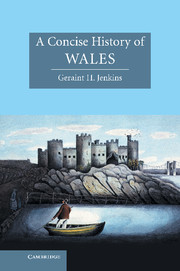Book contents
- Frontmatter
- Contents
- List of illustrations
- Preface
- 1 The earliest inhabitants
- 2 The Heroic Age, 383–1063
- 3 The Anglo-Norman conquerors, c. 1063–1282
- 4 Pestilence, rebellion and renewal, c. 1283–1536
- 5 Early modern Wales, 1536–1776
- 6 A crucible of the modern world, 1776–1900
- 7 Wales awakening? 1901–2006
- 8 Whither Wales?
- Sources of quotations
- Guide to further reading
- Index
- CAMBRIDGE CONCISE HISTORIES
8 - Whither Wales?
Published online by Cambridge University Press: 05 June 2014
- Frontmatter
- Contents
- List of illustrations
- Preface
- 1 The earliest inhabitants
- 2 The Heroic Age, 383–1063
- 3 The Anglo-Norman conquerors, c. 1063–1282
- 4 Pestilence, rebellion and renewal, c. 1283–1536
- 5 Early modern Wales, 1536–1776
- 6 A crucible of the modern world, 1776–1900
- 7 Wales awakening? 1901–2006
- 8 Whither Wales?
- Sources of quotations
- Guide to further reading
- Index
- CAMBRIDGE CONCISE HISTORIES
Summary
Few twentieth-century poets who composed in Welsh were more widely admired than Waldo Williams. Although he did not produce a large corpus of work, as an imaginative interpreter of the Welsh sense of identity he had few equals. Poems such as Cofio (Remember) and Cymru'n Un (Wales Is One) resonate with historians as compelling expressions of the interdependence of geography, history, landscape, people and language. He referred to ‘things that are long forgotten, / Now lost in dust of eras that have passed’ and viewed the role of the remembrancer as ‘keeping house amid a cloud of witnesses’. Thus, despite the title of this postscript, that which lies in the lap of the future is not part of a historian's remit. A nation is shaped by its history and by its people, and Wales, like every other nation, whether of long-standing or recent construction, requires a bank of cultural memory. History in all its forms, whether true or false, imagined or invented, spoken or written, told or retold, plays a critical role in a people's view of their identity. It is therefore worth considering how talismans of national identity have changed over the centuries and how historians have examined and fostered, according to the needs of their own times, an appreciation of the otherness of Wales. It bears repeating that Wales is an imagined community, a construct which, amoeba-like, changes its shape and character according to the desires of its people and the influence of external forces.
- Type
- Chapter
- Information
- A Concise History of Wales , pp. 301 - 306Publisher: Cambridge University PressPrint publication year: 2007

